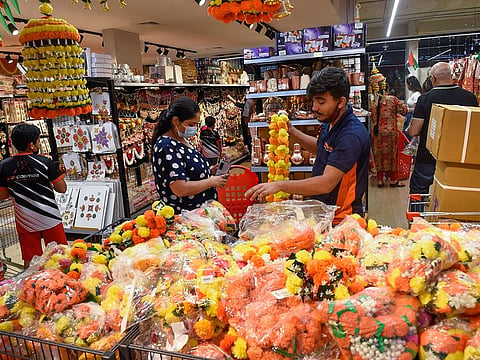UAE consumer prices remain in check as authorities step up monitoring ahead of Ramadan
UAE authorities step up inspections to maintain prices despite Red Sea issue

Dubai: The UAE Ministry of Economy is working closely with importers, wholesalers and retailers to make sure there are no sudden price increases on essential commodities, particularly on the food side. The process has been ramped up in recent days, traders say, and will continue all through to the start of the Ramadan period in March.
The process of close monitoring by the authorities has taken on fresh urgency as the global shipping industry adjusts to the disruptions brought on by the situation in the Red Sea. (Oil prices too are firming up this morning after news broke of the three US servicemen killed at a base in Jordan.)
We have confirmed supplies stretching anywhere from 6 months to 1 year at any given time.

Being one of the most crucial phases in the retail calendar, it’s typical that there is constant monitoring – at the trade and retail levels – on commodity prices in the run up to Ramadan. In the recent past, the UAE authorities have enforced strict measures on when and how prices can be changed. This has been a crucial element in tackling imported inflationary pressures during 2022-23, when food prices had risen sharply for a variety of reasons.
Prices are in check
Retail sources confirm that there has been no rise in prices of essentials over the last few weeks in the UAE. But the pressure on supplies and on their margins are intensifying.
“Yes, there is pressure on shipment prices and on logistics capacity, and our importers/shippers are feeling it,” said a retail industry source. “Shipment costs have been hitting $3,000 a TEU on certain routes, and that’s higher by $1,000 on the average we had been paying earlier.
“Where possible, these prices are being absorbed, the Ministry has clear guidelines on what the end-user prices should be.”
Ample stocks - and early orders for more
Wholesalers and retailers, including some of the biggest supermarket operators, are responding by placing orders early and making sure they get these at the agreed upon times.
“To be honest, we have not had any impact on our supplies – or stocks in-stores - in recent weeks,” said V. Nandakumar, Chief Communications Officer at LuLu Group. “As a group, we had been investing in food security measures since Covid, and this is clearly a time when those investments are paying off.
“We have confirmed supplies stretching anywhere from 6 months to 1 year at any given time. That in turn also means lock-in prices where possible at the store level, everything else being equal.”
Other retail industry sources say they are suitably covered for all situations.
Ramadan preparations
The process of building up stocks ahead of the Ramadan rush has already started. Consumer buying should pick up significantly by early March. As for now, grocery and supermarket retailers are pushing targeted promotions and cashback schemes to keep shoppers on their side.
Alternate sourcing where possible
Unlike during the Covid phase, shipment costs have only been rising on the Red Sea routes, essentially impacting Europe to the Middle East shipments.
“There are other options UAE importers can look to for all essential sourcing,” said Nandakumar. “It’s again a question of directing our orders to places from where those supplies can be met. We are working very closely with the suppliers and agri-pruducers in countries - in South Africa, India and the Far East - to beef up our sourcing operations there.
“The options are plenty and our shoppers will see that at any point of their visit in the days and weeks ahead.”
Sign up for the Daily Briefing
Get the latest news and updates straight to your inbox







